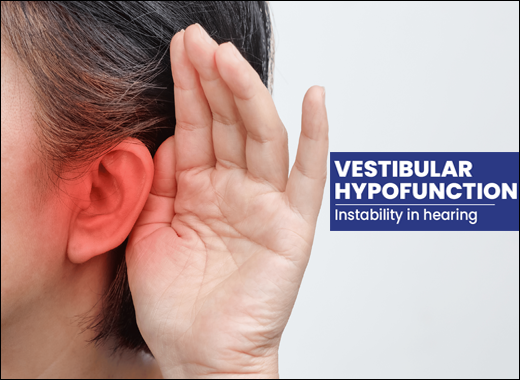Ayurvedic Treatment For Vertibular Hypofunction With Herbal Remedies
Abstract
Vestibular Hypofunction is a condition where the inner part of the ear is not working properly. It is unilateral or bilateral. Bilateral occurs due to damage to inner ear nerves. The inner ear cochlea and semicircular canals help in the balance of hearing defects in the inner ear leading to vestibular hypofunction. The vestibular system works with the eyes and muscles to maintain the normal functioning of the body. Abnormality in the inner ear leads to various symptoms according to the severity of the disease.

Introduction
Due to abnormality in the cochlea and semicircular canal of the inner ear, it leads to vestibular hypofunction. There can be two types: unilateral vestibular hypofunction and bilateral vestibular hypofunction. Unilateral vestibular hypofunction occurs when there is an abnormality in one ear and another ear works properly as a result various symptoms occur such as dizziness, vertigo, anxiety, and nausea. Bilateral vestibular hypofunction occurs when the peripheral vestibular system is not working properly as a result the person cannot walk in a dark room or on uneven surfaces, with the movement of the head having difficulty in seeing.
Causes
The causes of vestibular hypofunction are-
- Autoimmune disorders
- Infections
- Poor circulation in the ear
- Calcium debris deposition in the semicircular canal of the ear
- Inner ear problems
- Medicines
- Traumatic brain injury
- Blood clots
- Tumours that are vestibular schwannoma
- Meniere’s syndrome
Risk Factors
The risk factors include the –
- Ototoxicity (Hearing loss due to medicine)
- Meningitis (Inflammation of protective membranes covering the brain and the spinal cord)
- Autoimmune disorders
- Chronic inflammatory peripheral polyneuropathy
- Neurofibromatosis
- Sequential vestibular neuritis
Pathophysiology
The abnormality in the vestibular system affects one or both sides as a result of an abnormality in sensory functions and leads to various symptoms such as dizziness, motion sickness, vertigo, and hearing problems leading to vestibular hypofunction.
Symptoms
The symptoms of vestibular hypofunction are-
- Dizziness
- Blurred vision
- Changes in heart rhythm
- Anxiety
- Nausea
- Vomiting
- Diarrhoea
- Disorientation
- Vertigo
- Lack of coordination
- Hearing problems
- Lightheadedness
- Imbalance
- Difficulty in walking in dark room
- Imbalance in gait and posture
Diagnosis
The ENT specialist check the sign symptoms and severity of the disease and the following test are done to confirm the vestibular hypofunction-
- Hearing examination
- Dynamic visual activity – To assess the functional state of the vestibular system.
- Eye test – Check the nystagmus
- Clinical examination to check the balance
- Blood tests
- Posturography – To check the movement and posture
- Walking test with the involvement of head movement
- Oculomotor examination – To check the movement of the head and eye movement
- VEMP – Vestibular-evoked myogenic potentials
- SVV – Subjective visual vertical
- VNG – Videonystagmography
- DVA – Dynamic visual activity
- MRI of the brain (Imaging test of the brain and head)
- HRCT of the temporal bone
Treatment
The treatment of vestibular hypofunction includes-
- Standing balance activities
- Gaze stabilisation exercise – to coordinate the motion of the head and eye
- VRT – Vestibular rehabilitation therapy
- Medications
- Yoga exercise for balance (Dhanurasan and Halaasan)
- Surgical procedure
Ayurveda Aspect For Vestibular Hypofunction
In Ayurveda Acharya, it is correlated with भ्रम and explained under मानसिक व्याधि. It is due to Rajo guna (mansik dosha) and vitiation of vata and pitta dosha (sharira dosha). As a result, the sensation forms in the head, and vertigo and headache occur, as the movement of the eyeball, and hearing loss. It is peripheral when the defect is in the inner ear and it is central when the defect is in the brain. Due to vata dosha person feels himself rotating and due to pitta dosha, the person feels the surroundings are moving.
भ्रम according to मा.नि.१७।१९
“चक्रवद् भ्रमतो गात्रं भूमौ पतति सर्वदा
भ्रमरोग इति ज्ञेयो रजः पित्त अनिलात्मकः”
As per madhava nidan due to Rajo guna and vata and pitta dosha, the person feels her body falling on land and feels vertigo symptoms.
Causes
- Avoid vata pitta dominating food
- Sour, salty, hot potency food
- Exposure to excessive heat
- Use of alcohol or tobacco
- Difficulty in sleeping at night
- Physical strain
Herbal Remedies For Vestibular Hypofunction By Planet Ayurveda
Planet Ayurveda is a GMP-certified Company . The products are made with 100% natural ingredients and free from any adulterants, fillers, yeast, preservatives, and chemicals. The preparation is done under M.D. Ayurveda experts. The products are easy to use without any side effects. The planet Ayurveda provides herbal remedies to cure vestibular hypofunction-
Products List
- BOSWELLIA CURCUMIN
- GUGGUL CAPSULES
- NEUROGENIE CAPSULES
- INDIAN VALERIANA
- MEMORY SUPPORT
Dosage
- Boswellia Curcumin – 2 capsules twice daily, with plain water, after meals.
- Guggul Capsules – 1 capsule twice daily, with plain water, after meals.
- Neurogenie Capsules – 2 capsules twice daily, with plain water, after meals.
- Indian Valeriana – 1 capsule twice daily, with plain water, after meals.
- Memory Support – 1 capsule twice daily, with plain water, after meals.
Products Description
1. Boswellia Curcumin
Boswellia curcumin capsules are made up of 100% natural herbs with a pure vegetarian formula. It contains the extraction of Curcumin (Curcuma longa), and Boswellia serrata (Shallaki). It has analgesic and anti-inflammatory properties so helps in reducing pain and inflammation. As the condition occurs due to vitiation of vata dosha both drugs are pacify vata dosha. Curcumin works as an antifungal to reduce infection of the ear. Curcumin also protects from ear damage due to certain medicines. It promotes the natural healing of the ear.
2. Guggul Capsules
The guggul capsules are made up of a single standardised extraction of Guggul (Commiphora mukul). Guggul contains anti-inflammatory properties so it reduces pain, swelling, and inflammation of the ear. It removes toxins from the ear as a result improves circulation in the ear and clears the channels. It gives a soothing effect on the ear and reduces the pain of the ear.
3. Neurogenie Capsules
The neurogenie capsules contain extracts of Bacopa monnieri (Brahmi) and Withania somnifera (Ashwagandha). Both herbs have a tranquilising effect on the nervous system so they help in the intensity of tinnitus, symptoms of anxiety. It improves the blood circulation of the ear which helps in the proper functioning of the ear. As both herbs pacify the vata dosha it helps to reduce symptoms of vata dosha in the ear.
4. Indian Valeriana
The Indian Valerian capsules are made up of a single extraction of Tagar (Valeriana wallichii). Pacify the vata dosha and improve hearing. Improve the function of the inner ear nerve and improve hearing loss. It pacifies all three doshas especially vata as vata dosha shaman occurs. It reduces stress and anxiety so it is helpful in treating insomnia.
5. Memory Support
The memory support capsules contain Vacha (Acorus calamus), Brahmi (Bacopa monnieri), Shankhpushpi (Convolvulus pluricaulis), and Licorice (Glycyrrhiza glabra). Vacha contains anti-microbial, anti-inflammatory, and antiseptic properties so it is helpful in ear discharge, pus collection, ear injuries, vertigo, and tinnitus. Brahmi has tranquillising effects; it calms the nervous system and reduces the symptoms of tinnitus. Licorice gives strength to the acoustic nerve, inner ear, and hearing centre of the brain and helps in the normal functioning of the ear.
Conclusion
The introduction, causes, symptoms, Ayurvedic aspect, and treatment are discussed in this article. In Ayurveda, it is similar to Brahma where the person feels nausea, anxiety, dizziness, vertigo, and tinnitus. Due to Rajo guna and vitiation of vata and pitta dosha, there is an obstruction in the channels that affects the semicircular canal, cochlea, and acoustic nerve which leads to abnormality in hearing and proper function of the ear. It occurs in one or both ears as dosha is vitiated and affects the normal functioning of the body. The Planet Ayurveda provides an herbal remedy to cure vestibular hypofunction are- Boswellia curcumin, Guggul capsules, Neurogenie capsules, Indian Valeriana, and Memory support.




